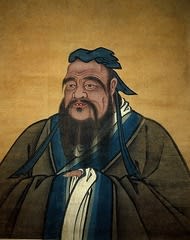
【原文】
子夏曰、賢賢易色、事父母、能竭其力、事君能致其身。與朋友交、言而有信、雖曰未學、吾必謂之學矣。
【読み下し】
子夏が曰わく、賢を賢として色に易(か)え、父母に事(つか)えて能(よ)く其の力を竭(つく)し、君に事えて能くその身を致(いた)し、朋友と交わるに言いて信あらば、未だ学ばずと曰うと雖ども、吾は必ずこれを学びたりと謂わん。
【通釈】
子夏がいった、「すぐれた人をすぐれた人として[それを慕うことは]美人を好むようにし、父母に仕えてはよくその力をつくし、君に仕えてはよくその身をささげ、友達との交際ではことばに誠実さがある、[そうした人物なら、だれかが]まだ学問はしていないといったところで、わたしはきっと学問をしたと評価するだろう。」
【English】
Zi Xia said " I would grant that a man is indeed schooled if he revered virtues instead of beauty, devoted in serving his parents, exert himself to the utmost in serving his lord, and behave with trustworthiness with his friends, even though he is said to be not schooled.
Tsze-hsia said, "If a man withdraws his mind from the love of beauty, and applies it as sincerely to the love of the virtuous; if, in serving his parents, he can exert his utmost strength; if, in serving his prince, he can devote his life; if, in his intercourse with his friends, his words are sincere:-although men say that he has not learned, I will certainly say that he has.
『論語』とは、読んで字の如く「論じ語る」、孔子と弟子達や要人達との間に交された対話録。
『論語』は私たちの生き方の原点を見つめた思索の宝庫であり、人間性を磨く叡智が凝縮した永遠の古典。
読めば読むほど胸に深く沁み込む簡潔な言葉の数々。
『孟子』『大学』『中庸』と併せて儒教における「四書」の一つに数えられる。
全20編(学而第一~堯曰第二十) 構成され、編の名称は各編の最初の二文字を採ったものであり内容上の意味はない。
したがって、学而第一から順に読む必要はなくどこから読んでもかまわない。
















